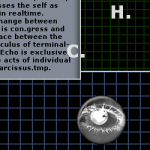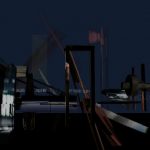2004
A thirst for interaction fuels Adrianne Wortzel's response.
Bill Seaman hyphenates the "hybrid-languages" of Lexia to Perplexia.
Brenda Laurel takes a turn at the rules of operation for Interactive Fiction.
Eugene Thacker's question: "To what degree does language account for the markers and meanings of embodied difference?"
Janet Murray unriddles the verbal and procedural mix of Interactive Fiction.
"Thinking around the responses," Jill Walker reconsiders how gender and identity influence the reader-reading-the-reader in Online Caroline.
A response that bridges things, as metaphors do.
Nick Montfort reiterates the value of multiple perspectives on, and in, New Media.
Warren Sack sheds some psychosocial light on readings, like Jill Walker's, of the uncanny.
Lucy Suchman's directive for talking things: "the creative elaboration of the particular indexical affordances of machine 'speech.'"
Natalie Jeremijenko asserts that machine speech should re-awaken us to "the peculiar structure of participation that we take for granted."
Simon Penny adds object-context to the talking machines of Natalie Jeremijenko's essay.
"Connect the n space to the 0 and understand that the lack of time due to information overflow is an illusion," writes Victoria Vesna.
Phoebe Sengers praises the optimistic, self-aware conversation mapped by Warren Sack and First Person.
Rebecca Ross asks how observing a conversation might change it.
An autobiographical reflection by Warren Sack, prompted by two particular questions.
Text and full-size sidebar images from "What Does a Very Large-Scale Conversation Look Like?"
Sidebar images from "Approaches to Interactive Text and Recombinant Poetics - Media-Element Field Explorations."


